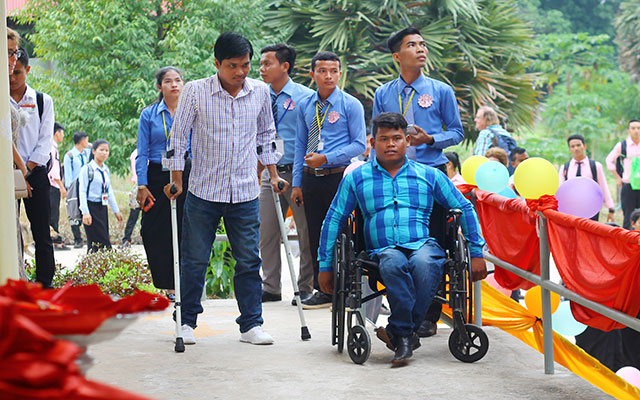
Transforming Buildings, and Transforming Lives
In 2013, Don Bosco Kep — a Salesian-run vocational training center in southern Cambodia — first opened its doors to students living with disabilities. Today, thanks to assistance from USAID’s Office of American Schools and Hospitals Abroad (USAID/ASHA), the center has become the country’s first handicapped-accessible school campus — and stands as a model for Cambodia’s educational system as a whole.
“This is not a school for the disabled,” says Father Albeiro Rodas Samnang, director of Don Bosco Kep. “It is a school where students with disabilities will be fully integrated.”
Such opportunities are especially crucial in Cambodia where, according to Fr. Albeiro, “children and youth with disabilities are among the most marginalized members of society: they are often confined to their homes, unable to attend school and are actively excluded from the workforce.”
“We know that youth living in poverty are challenged to access educational opportunities that provide the skills necessary to lead stable, productive lives,” adds Father Mark Hyde, director of Salesian Missions. “For impoverished youth living with disabilities, these challenges are particularly acute. Inadequate infrastructure, improperly trained educators and other factors conspire against these boys and girls — creating physical and social barriers to educational inclusion. In turn, this correlates to ongoing unemployment, endemic poverty and poor health.”
Salesian missionaries and dedicated staff at Don Bosco Kep are committed to changing this.
While welcoming students with disabilities to campus represented a significant first step toward leveling the playing field, administrators knew it wasn’t enough. Students who relied on wheelchairs, for example, often depended on their peers to carry them to classrooms and dormitory quarters on higher floors. “It made me feel like a burden,” says Ang, whose childhood brush with polio left him confined to a scooter. “It affects your self-esteem.”
This obstacle was addressed thanks to a 2015 grant from USAID/ASHA secured by the Salesian Missions Office for International Programs. The funding provided for the installation of elevators in the main buildings as well as the modifications needed to make community spaces and a dormitory fully accessible for students and teachers. As a result, Ang — and other students living with disabilities — are now able to live and attend school independently.
On Jan. 17, 2017, Salesian Missions representatives celebrated the improvements alongside Salesian missionaries during a special ceremony at the school that was attended by faculty, staff, students and local and visiting dignitaries. Speakers included Sean Callahan, deputy mission director of USAID; Fr. Mark; Father Roel Soto of the Salesians of Cambodia; and H.E. Khem Satha, a government representative.
“Cambodian society has the duty to integrate all its citizens with disabilities, by providing physical access in public places, schools and factories, and by educating citizens on the acceptance of disabled people,” says Fr. Albeiro.
Don Bosco Kep specializes in technical education for impoverished youth from rural communities in Kep, Kompot and Takaew, offering courses in social communication and journalism; housekeeping; tailoring; electricity; information technology; agriculture; culinary studies; hospitality and art communication; and other viable trade skills. Today, it also stands as a model for ensuring that all students have opportunities to lead fulfilling lives, and to contribute to the social, cultural and economic vitality of their communities.
Our mission opens doors to opportunities for students with disabilities. What is your mission?

